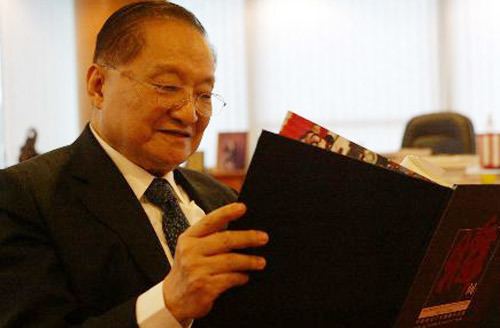Fans across the Chinese-speaking world mourned the death of martial arts writer Louis Cha, better known by his pen name Jin Yong, who died on Tuesday afternoon.
Cha, 94, best known for his epic wuxia novels following kung fu heroes in ancient China, passed away in a hospital in Hong Kong after a long illness, according to Hong Kong media.
While few of his books have been translated into English, Cha is one of the world’s most-read Chinese authors, with fans across China, Hong Kong, Taiwan and throughout the Chinese diaspora. His stories have been adapted into television shows, films, comic books, and video games. The first part of his most popular series, Legends of the Condor Heroes, was published in English earlier this year.
Cha was born in China, but moved to Hong Kong before the Chinese Communist Party’s takeover of the country in 1949.
Fans posted online their favourite stories and lines from his books. Others remembered his novels as a key part of their childhood. “I read your books during class, hidden in my desk. You were with me for my entire youth. You’ve left now, but you are still here,” one wrote.
A hashtag marking his death was one of the top trending topics on Weibo, viewed more than 1.3 billion times by Wednesday afternoon. In Xiangyang, a city in central China often featured in Cha’s novels, residents held a candlelight vigil on the city’s ancient walls.
Chip Tsao, a columnist in Hong Kong and friend of Cha’s, said the novelist was the “the greatest storyteller in Chinese literature for more than 300 years”, according to local media.
On Wednesday, Cha’s profile on the search engine Baidu was turned to black and white. On Taobao, the e-commerce giant founded by Jack Ma, also a fan, customers who searched for Jin Yong related products were greeted with Cha’s photo and a famous quote from one of his novels: “Look at the clouds, gathering and dispersing, dispersing and then gathering. Life is this.”
The sprawling worlds that Cha created, which blended martial arts, fantasy, and romance, have led to comparisons with JRR Tolkien. His stories often feature heroes who defend the powerless.
One fan wrote: “The world he created represents the dreams of this generation, the one before, and many more. At the end of every story, the spirit of chivalry and justice is felt. I hope this spirit will continue to be passed down.”
For decades, Cha refuted any political interpretations of his novels. As an essayist and co-founder of one of Hong Kong’s largest independent newspapers, Ming Pao, he often criticised the excesses of the Communist Party. His father, deemed a class enemy, was executed in China. In a 2014 interview with the New Yorker, Cha admitted the allegories in his stories.
“Master Hong of the Mystic Dragon Sect?” he told the magazine, referring to the antagonist of his novel, The Deer and the Cauldron. “Yes, yes — that means the Communist Party.”
Cha said in a speech, published in 2005: “It does not matter to me whether I become a historical figure. All I want is that after one or two hundred years, there will still be people reading my books.”
Source:TG
Image Courtesy:Alchetron
You may also like
-
Beware! Chinese Hackers are Using VLC Media Player to Spy on You
-
Israel Participates in US Mideast Naval Exercise wih Saudi Arabia and Oman – IMX 22
-
Pakistani Establishment Controlling ‘Family Business’ of Selling Kashmir Narrative, Uses Issue as Survival Strategy: Report
-
After Suspending Twitter ‘Indefinitely’, Nigerian Govt Joins Made-In-India Microblogging Platform ‘Koo’
-
Pam Gosal, First Indian-Origin Woman to be Scottish Lawmaker
